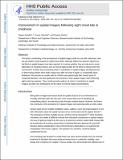Improvement in Spatial Imagery Following Sight Onset Late in Childhood
Author(s)
Gandhi, Tapan Kumar; Ganesh, Suma; Sinha, Pawan
DownloadSinha_Improvement in.pdf (530.3Kb)
OPEN_ACCESS_POLICY
Open Access Policy
Creative Commons Attribution-Noncommercial-Share Alike
Terms of use
Metadata
Show full item recordAbstract
The factors contributing to the development of spatial imagery skills are not well understood. Here, we consider whether visual experience shapes these skills. Although differences in spatial imagery between sighted and blind individuals have been reported, it is unclear whether these differences are truly due to visual deprivation or instead are due to extraneous factors, such as reduced opportunities for the blind to interact with their environment. A direct way of assessing vision’s contribution to the development of spatial imagery is to determine whether spatial imagery skills change soon after the onset of sight in congenitally blind individuals. We tested 10 children who gained sight after several years of congenital blindness and found significant improvements in their spatial imagery skills following sight-restoring surgeries. These results provide evidence of vision’s contribution to spatial imagery and also have implications for the nature of internal spatial representations.
Date issued
2014-01Department
Massachusetts Institute of Technology. Department of Brain and Cognitive SciencesJournal
Psychological Science
Publisher
Sage Publications
Citation
Gandhi, T. K., S. Ganesh, and P. Sinha. “Improvement in Spatial Imagery Following Sight Onset Late in Childhood.” Psychological Science 25, no. 3 (January 9, 2014): 693–701.
Version: Author's final manuscript
ISSN
0956-7976
1467-9280